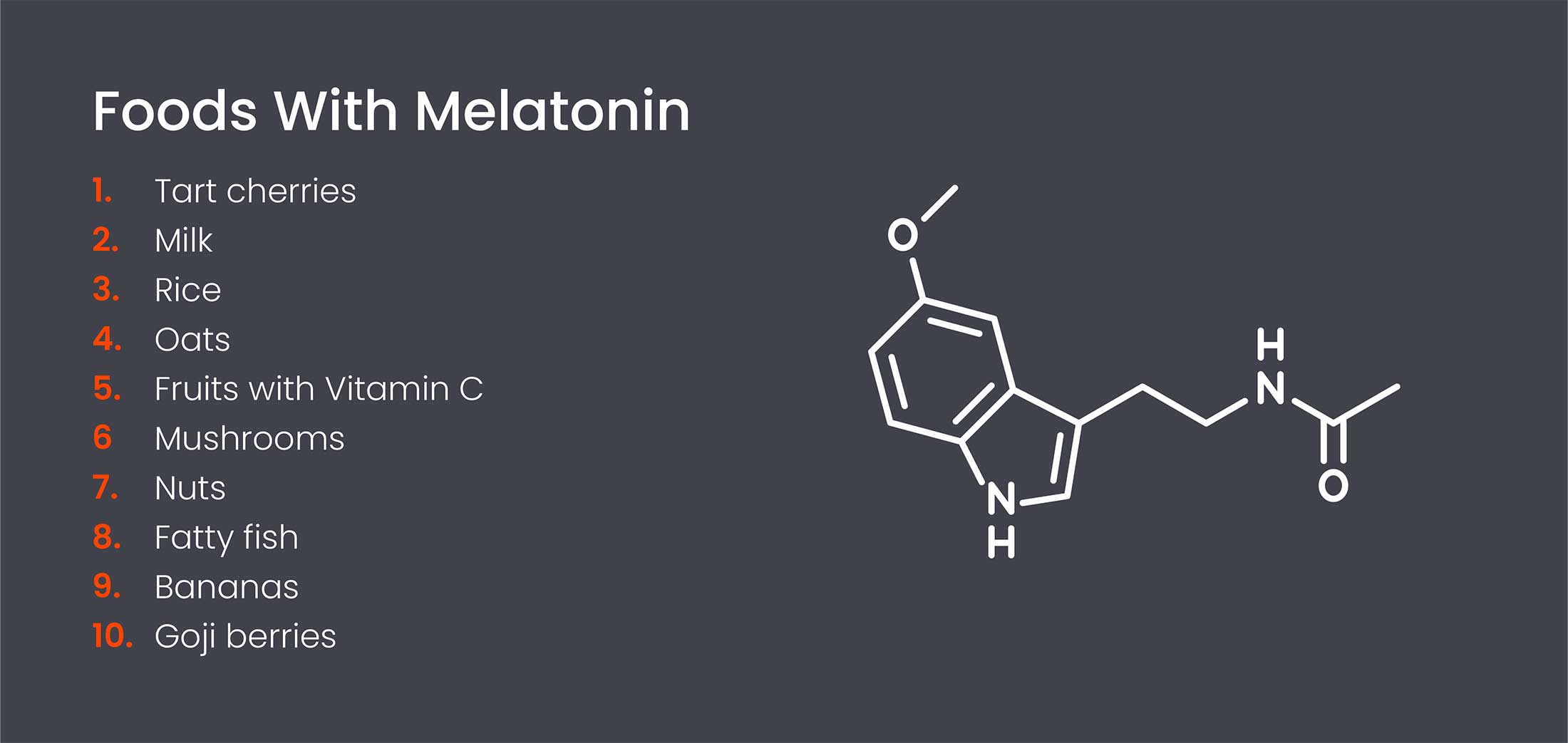10 Foods With Natural Melatonin to Promote Sleep

In the quest for a restful night’s sleep, many turn to various remedies, from supplements to meditation. One natural approach you can try is incorporating melatonin-rich foods into your diet to promote a better night’s sleep.
Melatonin is a hormone produced in the body that regulates sleep and wakefulness, and its natural presence in some foods can potentially promote a more restful slumber. In this article, we’ll explore ten foods that are not only delicious but also contain natural sources of melatonin. From fruits to nuts and milk to mushrooms, these options can be easily incorporated into your evening routine to potentially enhance the quality of your sleep.
- What Is Melatonin?
- What Are Foods With Melatonin?
- Frequently Asked Questions
- Wrapping Up: Foods With Natural Melatonin
What Is Melatonin?
Melatonin is a naturally occurring hormone produced in the brain that regulates the sleep-wake cycle, also known as the circadian rhythm. The exposure to light and darkness in your environment influences the production and release of melatonin.

Typically, melatonin levels begin to rise in the evening as it gets darker, signaling to the body that it’s time to wind down and prepare for sleep. Conversely, exposure to light, especially natural sunlight, inhibits melatonin production and signals wakefulness.
What Are Foods With Melatonin?
Believe it or not, the foods you eat throughout the day can be natural sleep aids. Melatonin isn’t just a supplement – it’s naturally produced in the body and found in certain foods. These natural sources offer an intriguing avenue for those seeking sleep-enhancing benefits without solely relying on supplements. Let’s explore some of the foods with melatonin for sleep enhancement:

1. Tart cherries
Tart cherries, specifically Montmorency cherries, have been identified as a natural source of melatonin. This is particularly beneficial for those looking to improve their sleep quality. In a recent study, participants who consumed cherry juice experienced a significant increase in total melatonin content.
The study also noted improvements in various sleep-related parameters, including increased time in bed, total sleep time, and sleep efficiency.
2. Milk
Milk, a staple in many diets, contains tryptophan, an amino acid that serves as a precursor to melatonin. Tryptophan is converted to serotonin — a neurotransmitter that influences happiness — in the body and further metabolized into melatonin, contributing to its potential sleep-inducing effects.
A systematic review of studies conducted between 1972 and 2019 revealed that a well-balanced diet, including milk and dairy products, was associated with improved sleep quality. Adequate consumption of milk and dairy was linked to meeting daily calcium intake recommendations, which correlated with better sleep habits.
3. Rice
While rice might not be as commonly associated with melatonin as other foods, studies have shown that various cereals, including rice, contain measurable amounts of melatonin.
According to a study, different rice cultivars exhibit varying levels of melatonin, with pigmented rice containing higher concentrations than non-pigmented varieties. The research also highlighted that melatonin levels were higher in whole rice compared to polished rice.
4. Oats
Rich in complex carbs and dietary fiber, oats are an excellent source of sustained energy, promoting stable blood sugar levels while fostering a sense of fullness after eating. In addition to rice, melatonin has been identified in significant quantities in various cereal grains, including wheat, barley, and oats.
Studies consistently demonstrate that these common cereals contribute to melatonin intake, showcasing their potential role in promoting more restful sleep.
5. Fruits with Vitamin C
Vitamin C-rich fruits offer a multitude of benefits, including immune support, antioxidant protection, collagen formation, and much more. Among these fruits, grapes, cherries, and strawberries have been identified as notable sources of melatonin. So, the next time you bite into a strawberry, be mindful of how you sleep at night!
6. Mushrooms
Mushrooms are a good source of essential nutrients, including B vitamins, minerals, and antioxidants. Certain mushrooms are even known for their immune-boosting properties and anti-inflammatory effects. However, mushrooms are also a source of melatonin across different species.
7. Nuts
In addition to being a tasty and convenient snack, nuts also contain melatonin, offering potential benefits for sleep regulation. Melatonin content in nuts can vary among different types, but pistachios have been reported to have the highest melatonin content.
In addition to their melatonin content, nuts offer various other health benefits, like heart-healthy monounsaturated and polyunsaturated fats, which help lower cholesterol levels and reduce the risk of heart disease. They’re also packed with essential nutrients like vitamin E, magnesium, potassium, and antioxidants to support overall health and well-being.
8. Fatty fish
Fatty fish, such as salmon, are a rich source of omega-3 fatty acids and contain melatonin. Fish are also an excellent source of high-quality protein, essential for muscle repair, immune function, and overall cellular health.
Fish are also one of the few natural dietary sources of vitamin D, which is crucial for bone health and immune function and plays a role in various metabolic processes.
9. Bananas
Bananas are a good source of essential nutrients, including potassium, vitamin C, vitamin B6, and dietary fiber, which support various bodily functions, including heart health, immune function, and digestive health. Bananas are also a quick and natural energy source, providing a blend of natural sugars, complex carbohydrates, and fiber, making them an excellent choice for a pre-workout snack or midday energy boost.
Besides being a convenient and delicious snack, bananas are a source of melatonin. In a study, male volunteers demonstrated that eating bananas increases melatonin concentrations. These findings suggest that bananas contribute to elevating melatonin levels in the body, potentially influencing sleep patterns.
10. Goji berries
Goji berries are rich in antioxidants that help combat oxidative stress and support overall cellular health. They’re also an excellent source of essential vitamins and minerals like vitamin C, vitamin A, iron, and zinc.
Most importantly, goji berries are also a source of melatonin. In a study, six berry species were examined for their melatonin content, and the goji berry was found to have the highest melatonin content.
Frequently Asked Questions
What foods should you avoid before bed?
While there are many healthy foods and foods with natural melatonin that can support sleep, there are also foods that can disrupt sleep. What you eat before bedtime plays a crucial role in your sleep quality. Foods to avoid include the following:
- Spicy foods: Spicy dishes can cause indigestion and discomfort, potentially disrupting sleep.
- Acidic foods: Highly acidic foods may contribute to acid reflux or heartburn, impacting sleep quality.
- High-sugar foods: Sugary treats and desserts can lead to energy spikes and crashes, affecting your ability to fall asleep and stay asleep.
- Caffeine: Avoid caffeine-containing beverages like coffee, tea, and some sodas, as caffeine is a stimulant that can interfere with sleep. Typically, the best time to drink coffee is about an hour after waking up.
- Alcohol: While alcohol may initially induce drowsiness, it can disrupt the later stages of deep sleep.
- Citrus fruits: Citrus fruits are a diuretic that can wake you with a sudden urge to go to the bathroom in the middle of the night.
Why is melatonin important?
Melatonin is a crucial hormone that regulates the sleep-wake cycle and maintains the circadian rhythm. Often referred to as the “sleep hormone,” melatonin responds to the natural progression of darkness and light.
Its primary role is signaling to the body that it’s time to wind down and prepare for sleep, thus playing an important role in sleep regulation. Beyond this, melatonin helps synchronize the body’s internal clock, known as the circadian rhythm, with the external environment. This coordination is crucial for various processes, including sleep, metabolism, and immune function. It can also help you repay your sleep debt by re-regulating your sleep cycle and allowing you to get back to a routine.
What are other tips for improving sleep?
Sleep quality is a cornerstone of overall well-being, including physical and mental health. Establishing good sleep habits is essential for achieving restorative and consistent rest. Here are additional tips to enhance your sleep quality:
- Maintain a consistent sleep schedule: Go to bed and wake up at the same time every day, even on the weekends. This helps regulate your body’s internal clock, promoting a more predictable sleep pattern.
- Create a bedtime routine: Engage in relaxing activities before bed, such as reading, gentle stretching, or meditation. Establishing a routine signals to your body that it’s time to wind down.
- Optimize your sleep environment: Ensure your bedroom is cool, dark, and quiet. Turn down your thermostat, invest in black-out shades, and use white noise to sleep if necessary. You can also invest in bamboo sheets to help you stay cool during the summer months.
- Limit exposure to screens before bed: Reduce exposure to electronic devices with screens at least an hour before bedtime.
- Exercise regularly: Incorporate regular physical activity into your routine. Aim for at least 30 minutes of moderate exercise most days, but avoid vigorous workouts close to bedtime.
- Manage stress: Practice stress-reducing techniques, such as deep breathing, meditation, yoga, or listening to a sleep playlist. Addressing stress and anxiety contributes to a more relaxed state conducive to sleep.
- Evaluate your mattress and pillows: Ensure your mattress and pillows provide adequate support. Replace your bed with a memory foam mattress if it’s old or uncomfortable.
- Enjoy natural light: Spend time outdoors during the day, especially in the morning. Natural light exposure helps regulate your body’s internal clock.
Wrapping Up: Foods With Natural Melatonin
Incorporating foods with melatonin in your diet is a natural approach to promote a better night’s sleep. From tart cherries to fatty fish and goji berries, these options offer a great midnight snack and sleep-enhancing benefits.
As you begin your quest for better sleep, consider Layla’s mattress options. Our memory foam and hybrid mattresses will perfectly complement your sleep-promoting habits while ensuring a comfortable environment for you to drift off into dreamland.






